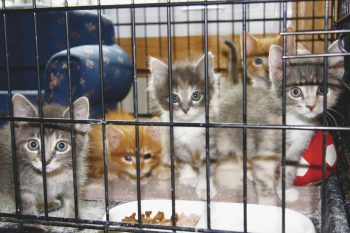 Veterinarians at Pennsylvania’s Department of Agriculture have confirmed that almost a dozen cats that may have been exposed to an avian-type influenza virus in New York City shelters have been placed in special quarantine in one of three animal shelters in Chester County.
Veterinarians at Pennsylvania’s Department of Agriculture have confirmed that almost a dozen cats that may have been exposed to an avian-type influenza virus in New York City shelters have been placed in special quarantine in one of three animal shelters in Chester County.
The low-pathogenic influenza virus does not pose a health hazard to people, according to the Pennsylvania Department of Health, however, health officials reminded citizens to wash their hands thoroughly and exercise precautions recommended during flu season–especially for those people who may have come into contact with the quarantined cats that originated from the New York shelters or were exposed to cats from these shelters.
The Agriculture department is involved because the North American H7N2 virus has been sequenced and is reportedly identical to the virus found in turkeys and chickens in Pennsylvania and Virginia during the 2002-2003 winter season.
“The cats we’re testing and monitoring were transferred last month from an animal shelter in New York before some of the cats developed symptoms similar to a head cold or mild case of the flu. The cats have a low-pathogenic variety of the avian influenza virus,” explained State Veterinarian Dr. David Wolfgang. “Fortunately, we have no indication that any poultry flocks have been exposed to an infected cat.”
There have been no reports of infected cats spreading the virus to other species, nor has the department received any information to suggest that the virus is causing any human illness, even among people in close contact with the cats.
The sick cats are being treated and are expected to recover fully. In the meanwhile, the Agriculture department has placed quarantines on three shelters in Chester County and has recommended that cat adoptions from those shelters should be postponed until further notice.
The Agriculture department is working with the three shelters to obtain records of any cats leaving these shelters since mid-November, when the affected cats were diagnosed. Representatives from the Agriculture department will contact anyone who has adopted or fostered cats from these shelters.
“During our outreach to those who have adopted or fostered any cats from these shelters, we ask whether they have backyard poultry or contact with commercial poultry flocks. If so, we will follow our normal avian influenza protocols, which involves treating the poultry as potentially exposed to avian influenza,” Wolfgang explained. “We would quarantine the poultry and test samples at least 14 days after the cat(s) arrived in the home.”
For the latest information on avian influenza, visit The Department of Agriculture’s Animal Health and Diagnostic Services page at AHDServices.






